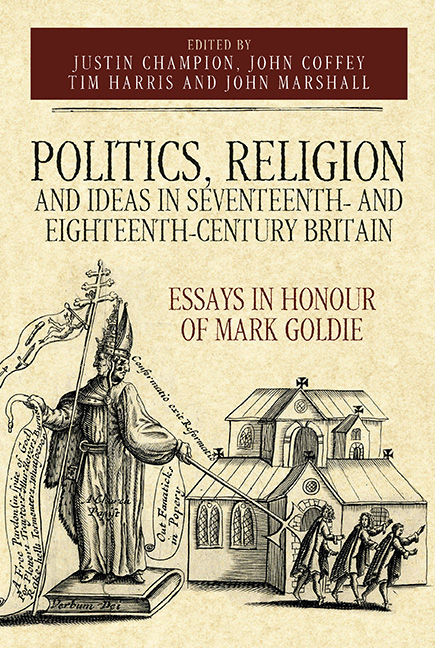 Politics, Religion and Ideas in Seventeenth- and Eighteenth-Century Britain
Politics, Religion and Ideas in Seventeenth- and Eighteenth-Century Britain Book contents
- Frontmatter
- Dedication
- Contents
- Notes on Contributors
- Acknowledgements
- Notes on Text
- Abbreviations
- Introduction: Mark Goldie – An Appreciation
- 1 Constitutional Royalism Reconsidered: Myth or Reality?
- 2 Teaching Political Thought in the Restoration Divinity Faculty: Avant-Garde Episcopacy, the Two Kingdoms and Christian Liberty
- 3 Violence, Protest and Resistance: Marvell and the Experience of Dissent after 1670
- 4 Bulstrode Whitelocke and the Limits of Puritan Politics in Restoration England
- 5 The Assassination of Archbishop Sharp: Religious Violence and Martyrdom in Restoration Scotland
- 6 Compassing Allegiance: Sir George Mackenzie and Restoration Scottish Royalism
- 7 Corruption and Regeneration in the Political Imagination of John Locke
- 8 Locke the Censor, Locke the Anti-Censor
- 9 London, Locke and 1690s Provisions for the Poor in Context: Beggars, Spinners and Slaves
- 10 The Reception of Locke's Politics: Locke in the République des Lettres
- 11 Court Culture and Godly Monarchy: Henry Purcell and Sir Charles Sedley's 1692 Birthday Ode for Mary II
- 12 Thanksgivings and the Signs of the Times: The Apocalypse in the Long Eighteenth Century
- 13 The ‘Secret Reformation‘ and the Origins of the Scottish Catholic Enlightenment
- 14 The Surprising Lineage of Useful Knowledge
- 15 The Vicissitudes of Innovation: Confessional Politics, the State and Philosophy in Early Modern England
- A Bibliography of the Writings of Mark Goldie
- Index
- Studies in Early Modern Cultural, Political and Social History
- Tabula Gratulatoria
8 - Locke the Censor, Locke the Anti-Censor
Published online by Cambridge University Press: 12 October 2019
- Frontmatter
- Dedication
- Contents
- Notes on Contributors
- Acknowledgements
- Notes on Text
- Abbreviations
- Introduction: Mark Goldie – An Appreciation
- 1 Constitutional Royalism Reconsidered: Myth or Reality?
- 2 Teaching Political Thought in the Restoration Divinity Faculty: Avant-Garde Episcopacy, the Two Kingdoms and Christian Liberty
- 3 Violence, Protest and Resistance: Marvell and the Experience of Dissent after 1670
- 4 Bulstrode Whitelocke and the Limits of Puritan Politics in Restoration England
- 5 The Assassination of Archbishop Sharp: Religious Violence and Martyrdom in Restoration Scotland
- 6 Compassing Allegiance: Sir George Mackenzie and Restoration Scottish Royalism
- 7 Corruption and Regeneration in the Political Imagination of John Locke
- 8 Locke the Censor, Locke the Anti-Censor
- 9 London, Locke and 1690s Provisions for the Poor in Context: Beggars, Spinners and Slaves
- 10 The Reception of Locke's Politics: Locke in the République des Lettres
- 11 Court Culture and Godly Monarchy: Henry Purcell and Sir Charles Sedley's 1692 Birthday Ode for Mary II
- 12 Thanksgivings and the Signs of the Times: The Apocalypse in the Long Eighteenth Century
- 13 The ‘Secret Reformation‘ and the Origins of the Scottish Catholic Enlightenment
- 14 The Surprising Lineage of Useful Knowledge
- 15 The Vicissitudes of Innovation: Confessional Politics, the State and Philosophy in Early Modern England
- A Bibliography of the Writings of Mark Goldie
- Index
- Studies in Early Modern Cultural, Political and Social History
- Tabula Gratulatoria
Summary
John Locke held the post of censor in 1664. In 1695 he played a noteworthy part in ending pre-publication censorship in England. On the face of it, Locke's two censorship moments should connect, with implications for our understanding of the ‘philosopher of freedom’. However, although separately each has received some attention, together they appear to have had none. Locke's role as censor moralis philosophiae at his Oxford college seems incidental to his later works and perhaps to his 1664 writings on the law of nature; his later contribution to parliament's abandonment of the 1662 Printing Act, so consequential for press freedom, disappoints inquirers who find Locke's anti-censorship case mired in mundane book trade issues. There is a more obvious reason for neglect of a connection, however, which is less the three decades separating the events than the linguistic and conceptual shifts over the next three centuries which separate our sense of ‘censorship’ from that of Locke's lifetime. In our time, it fell to Mark Goldie quietly to correct an influential misapprehension, that in 1695 Locke countenanced a replacement ‘Licensing Act’ retaining some measure of ‘preprinting censorship’. Goldie affirmed that ‘Locke's claim is that there should be no pre-publication censorship’. As he was aware, this usage of ‘censorship’ is ours, not Locke's, a useful shorthand standardly deployed in writing about past press control. In projecting the term on to the past, the question for scholars has tended to be whether ‘censorship’ connotes only pre-publication restraints, ‘for licensing is only part of the story’, as Goldie remarks. Historians debate whether England in 1695 saw ‘the end of censorship’, but in that time and place neither press licensing nor post-publication punishments were known as ‘censorship’.
In Locke's England, the terminology and concept remained closely bound to its classical antecedent: the ancient Roman office of censor charged with assessing citizens and overseeing morals and manners. Application of the words ‘censorship’ or ‘censor’ to the press was rare; application of the terminology to offices like that of Locke at Christ Church was unusual (it still is) but apt in context. In late 1663, it was Locke who was given the title ‘censor’ whereas Roger L'Estrange, to historians the censor of Restoration England, was made ‘Surveyour and Licencer’ of the press.
- Type
- Chapter
- Information
- Politics, Religion and Ideas in Seventeenth- and Eighteenth-Century BritainEssays in Honour of Mark Goldie, pp. 161 - 180Publisher: Boydell & BrewerPrint publication year: 2019


